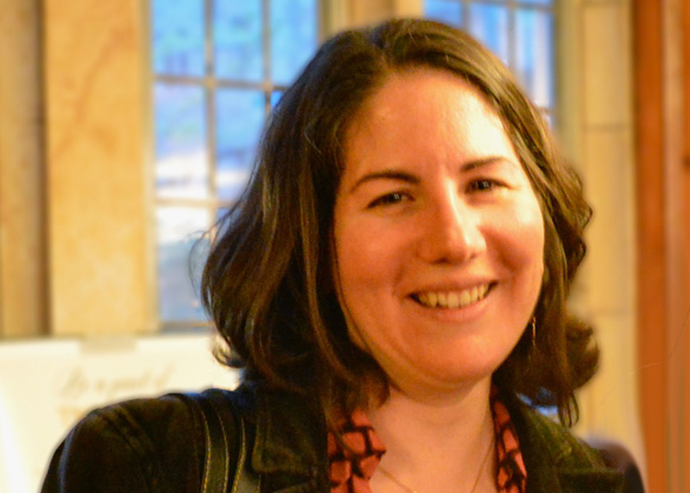
Advanced Certificate in Creative Writing, University of Pennsylvania '22
Doctor of Philosophy in American Studies, University of Maryland, College Park '11
Master of Arts, English, Villanova University '02
Bachelor of Arts, History and Psychology, Villanova University '96
As an academic coordinator with the Penn Center for Undergraduate Research and Fellowships (CURF), Christine Muller, PhD, helps nurture a challenging and enriching environment for Penn students striving toward their dreams. Outside of her dedication to higher ed, Christine has dreams of her own. “For as long as I can remember—as far back as when I was a pre-teen writing bad poetry—I’ve been interested in creative writing,” she says, but the logistics, resources, or timing had never lined up for her to explore the craft. When she received an employee email about the Penn LPS Online Certificate in Creative Writing, she saw the opportunity to chase down her dream.
In spite of being an experienced academic writer—she has published a book and a number of articles critiquing popular media—Christine knew the program would be a challenge. Creative writing was an unfamiliar skill set. “I love stories, but my experience was in analyzing film and television. I had never really written something original in those areas,” she explains. “When I started the certificate, I was open to trying any kind of creative writing,” she says, noting the breadth of genres the program covers.
She chose CRWR 2600: Fiction Workshop as her first course. Though the convenience of online learning was a plus for Christine, she was initially skeptical of the format, expecting online sessions to be static and less engaging than a traditional classroom experience. “My impression of online learning changed rapidly,” she admits, after the class began. “The online asynchronous option is incredibly flexible,” she notes, yet the Penn course did not sacrifice opportunities to connect with fellow students or instructors. “We all gelled over Zoom,” she says about optional live sessions. And with weekly discussion board assignments and student critiques, “we could still interact with each other and each other’s work,” she says, creating a dynamic learning environment. “Nothing was lost in the online experience, but you gain the ability to take courses within the pace of your life. Now that I understand how it can work, online learning would be my choice.”
Christine could feel her creative writing improve each week with each assignment. She felt encouraged by the instructor, Karen Rile, as well as by the other students. One of her stories from the course was even published in the quarterly literature magazine Cleaver—making it her first non-scholarly piece to be published.
As Christine progressed through the program, she continued to feel comradery with her classmates and instructors. “It was like we were fellow travelers,” she says, as they helped each other improve. She recalls, for example, one writing assignment from CRWR 3000: Writing About Place, where she wrote what she describes as a COVID-era haunted house story. “What was powerful about that class was that each writing prompt sent me down a creative path,” she says. “The final prompt got me started describing a house, and the story took off from there. The feedback from the other students and the instructor was so strong and helpful—it sent me farther down the path,” she remembers. By the final draft of the assignment, a simple writing prompt exercise had evolved into the first chapter of a novel.
For her final class of the six-credit advanced certificate, Christine took CRWR 3200: Screenwriting—the course she was most excited to take. “It really culminated everything for me. I realized how much I love screenwriting,” she says. The course, which challenges students to draft and revise the first 30 pages of a screenplay, introduced Christine to a new passion. She was intrigued by how the genre requires unique considerations and parameters for creating a screen-ready and screen-worthy story. After the course ended, she kept working on her screenplay, building out those first 30 pages into a completed first draft.
Months after finishing the certificate, Christine has kept up her creative writing practice. She is currently completing a second screenplay as well as re-drafting the first, and she plans to submit to competitions and festivals to get “coverage” (analysis and notes) from industry professionals. “It’s exciting to send something out into the world and get feedback,” she says. She has added three chapters to the manuscript for her haunted house novel so far, and has ideas for more screenplays she plans to develop. Christine also participates in a writing group with several writers she met in the certificate program.
Reflecting on her creative writing journey so far, Christine sees how much the certificate classes pushed her to get out of her comfort zone to discover a new way to write. “At first, I wasn’t sure how well I would be able to retrain myself to write differently,” she says. “Academic writing is like a funnel—you do all your research and you pour it into an argument that’s as narrow and specific and ironclad as possible. That’s how I wrote for a very long time,” she explains. “But through the certificate program, I was able to learn and change my writing.”
Now, Christine finds joy in the open creativity of her new writing practice. “Instead of just analyzing other works, I roll up my sleeves, jump in, and write something original. I get to drive what I’m going to write about. Sitting down for daily writing and being able to think ‘What’s going to happen to these characters? What’s going to happen next?’—I just love it,” she summarizes.
